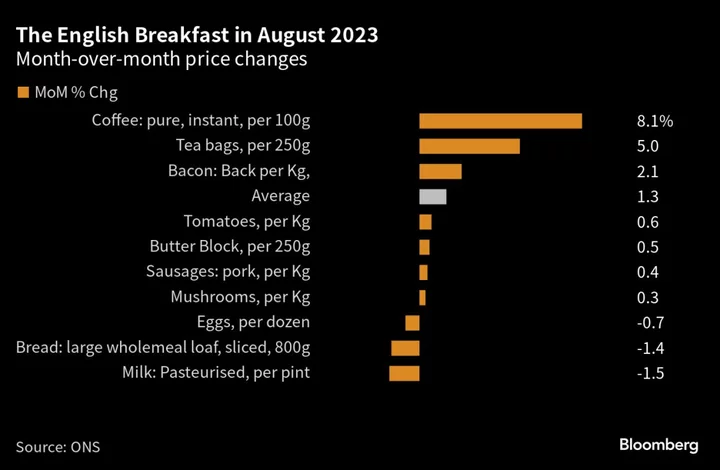The cost of a full English breakfast has risen to the highest on record even as broader measures of inflation ease, a sign of just how hard it is for British consumers to shake off rising food prices.
The total cost of all the components of a fry-up rose by 57 pence to £36.15 ($44.81) in August. Bloomberg’s monthly Breakfast Index uses product sizes provided by the Office for National Statistics to crunch prices of sausages, bacon, eggs, bread, butter, tomatoes, mushrooms, milk, tea and coffee.
“Shoppers are still seeing supermarket prices go up at an alarming rate, with increases on some foods far outstripping others,” said Sue Davies, head of food policy at consumer magazine Which.
The August increase comes after declines in May and July, showing that efforts to curb inflation have met with only sporadic success when it comes to the components of the English breakfast.
Food price rises eased in August to 13.6% from nearly 15% a month earlier, according to the ONS’s Consumer Prices Index. That’s along with broader inflation slowing to the lowest level in 18 months, a relief as the UK has had the worst inflation problem among the Group of Seven nations for months.
Market research firm Kantar also recorded a slowing of grocery price inflation for the sixth straight month in August, though the firm warned it’s not a number to celebrate. Many shoppers are still concerned about price pressures and almost a quarter of the population says they’re struggling financially.
Every component of the English breakfast cost more in August than a year earlier. The average cost of fry-up ingredients has increased by almost 12% during the period. Egg prices are more than 20% higher than a year ago, while sausages and bread cost 17% more.
Any diners who fancy Bloody Mary’s with their breakfast will have to pay more for that too. Alcohol inflation has leapt, largely due to a rise in alcohol duty earlier this year.
Supermarkets say they’re cutting prices on basic goods wherever possible. Budget supermarket Iceland Foods became the latest, broadening price cuts this week to include 1,000 items, from Lurpak butter to battered cod fillets.
“The cost-of-living crisis still very much has families in its grip,” said Richard Walker, executive chairman at Iceland.
Earlier this month, Waitrose cut prices for the third time this year as part of its plan to spend £100 million on bringing costs down for shoppers. The upmarket grocer owned by John Lewis Partnership Plc reduced 250 essential products, including pasta, potatoes and apples, by 10% on average.
The British Retail Consortium highlighted “hard work” by retailers to lower costs.
“Fierce competition between supermarkets has helped to bring down prices for many essentials including bread, butter, milk and fish,” said Helen Dickinson, chief executive officer of the BRC.
Still, there’s some way to go before the weekly shop gets meaningfully cheaper for consumers. Most categories in the Breakfast Index rose in price in August from a month earlier, with the exception of eggs, bread and milk. The average price of the ingredients gained by 1.3% from July, compared with a 1.2% decline the month before.
This story was produced with the assistance of Bloomberg Automation.
--With assistance from Leonid Bershidsky.

